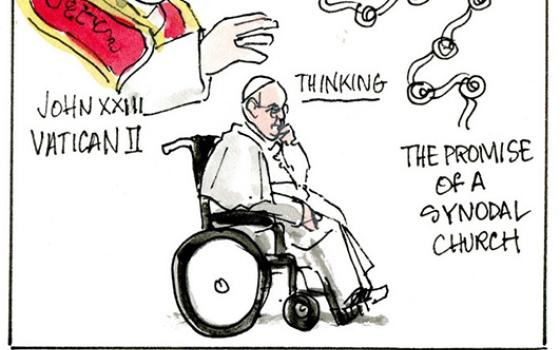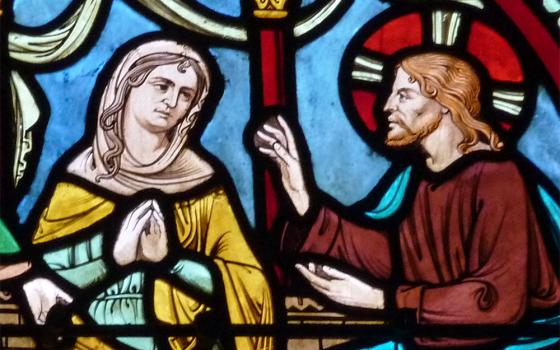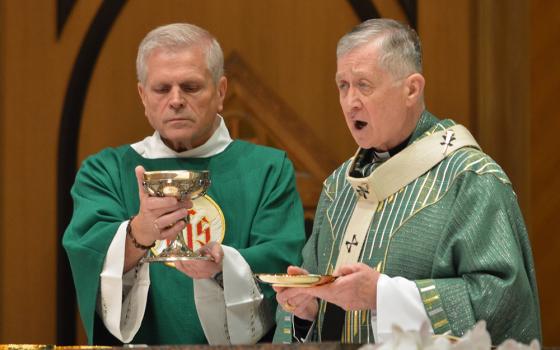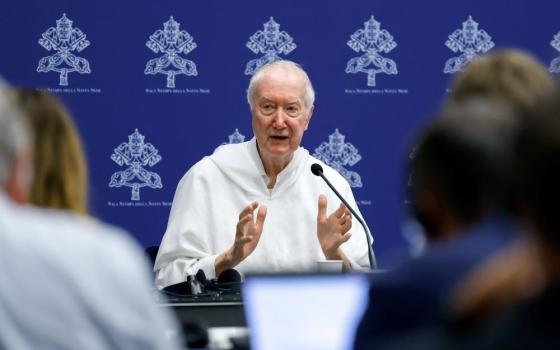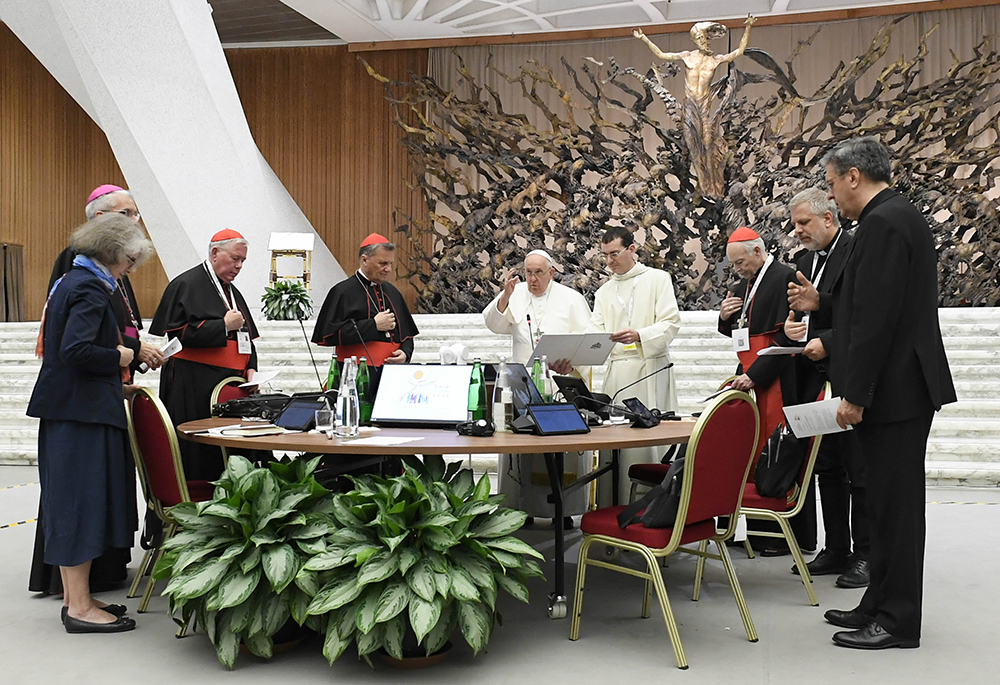
Pope Francis gives his blessing at the conclusion of the assembly of the Synod of Bishops' last working session Oct. 28, 2023, in the Paul VI Hall at the Vatican. (CNS/Vatican Media)
I was pleasantly surprised by the synthesis report, "A Synodal Church in Mission," from last October's first session of the synod on synodality. The full text is available here.
The report unabashedly calls for significant structural change — including, where indicated, a review of canon law and in other authoritative church documents.
Such changes could have profound implications for how governance and ministry function in a synodal church. Perhaps most surprising (to me at least) is the call for mechanisms of evaluation and accountability for priests, deacons and bishops and for an examination of the relationship between holy orders and jurisdiction.
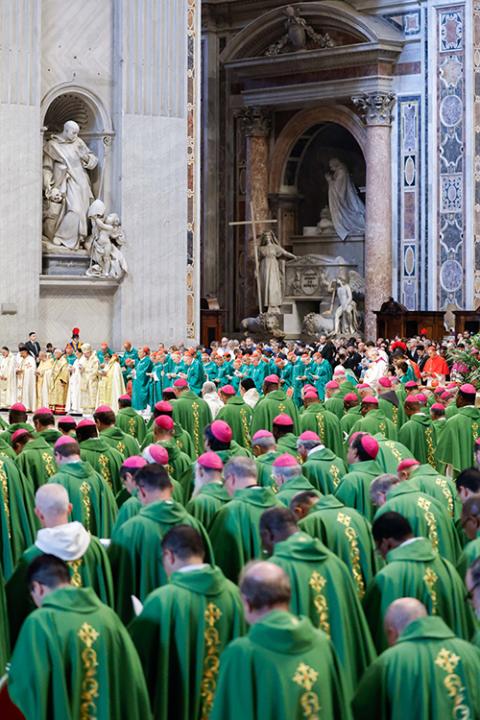
Cardinals and bishops join Pope Francis as he presides over Mass, marking the end of the first session of the assembly of the Synod of Bishops on synodality in St. Peter's Basilica Oct. 29, 2023, at the Vatican. (CNS/Lola Gomez)
The goal is to create more inclusive and accountable structures that will ensure the effective exercise of co-responsibility within the Roman Catholic Church.
In September 2018 I wrote a column suggesting theologian Leonardo Boff's book Church, Charism and Power, offered the church a way out of clericalism.
I suggested convening a worldwide synod "at which representation from all the people of God would have deliberative voice alongside bishops." It would include experts who would "recommend changes in canon law and in church policy to hold bishops accountable and integrate laity into decision-making so that we have deliberative voice (not just consultative) at every level."
I can hardly believe such prescience. Thankfully, the Holy Spirit works in many hearts as well as my own.
Boff was among the first to listen to the Spirit's voice in God's people. In his 1985 Introduction to Church, Charism and Power he wrote: "There are powerful and living forces, particularly at the grassroots, that are not sufficiently recognized. … The grassroots are asking for a new structure, a new ecclesial division of labor and of religious power. For this, a new vision of the Church is necessary."
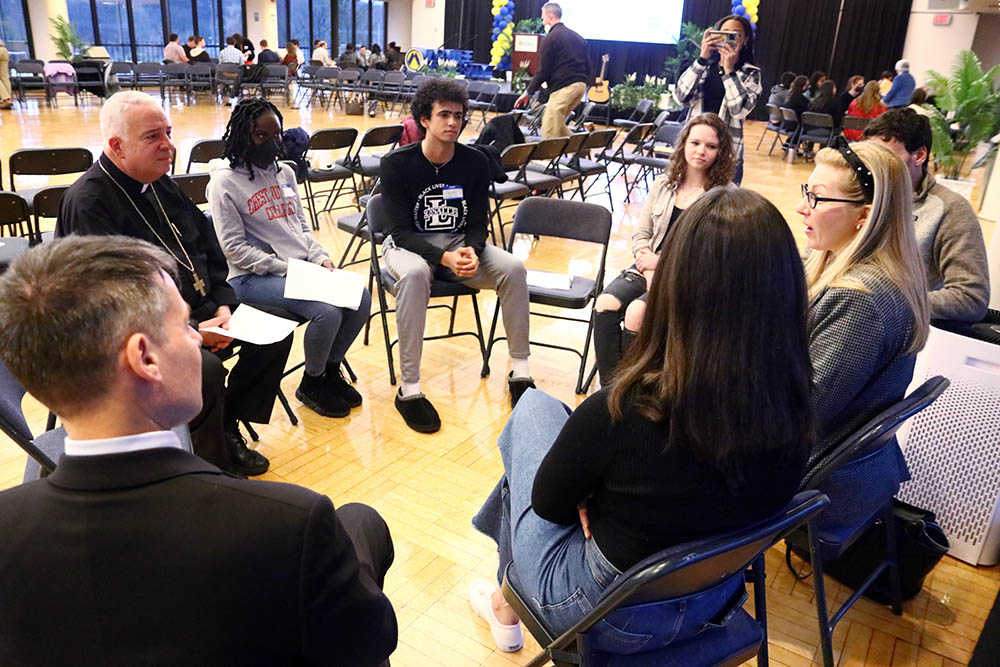
Philadelphia Archbishop Nelson Pérez joins college students, other young adults and ministry leaders during a synodal listening session at La Salle University April 4, 2022. (CNS/CatholicPhilly.com/Sarah Webb)
There is reason to believe that Boff's ecclesiology influenced Francis' vision of synodality and church governance. Like Boff, Francis is famous for recognizing the Spirit at work in ordinary Catholics.
Below is a sampling of significant aspects of the synthesis report.
In the first (of 20) topical areas approved by two-thirds majority vote, synod members said that "synodality represents the future of the Church."
The need for a growing as a synodal church occurs repeatedly throughout the 41-page text.
Topic 8 ("Church is Mission") names a foundational agreement about the basis and necessity of co-responsibility:
The sacraments of Christian initiation confer on all the disciples of Jesus the responsibility for the mission of the Church. Laymen and laywomen, those in consecrated life, and ordained ministers have equal dignity. … The exercise of co-responsibility is essential for synodality and is necessary at all levels of the Church.
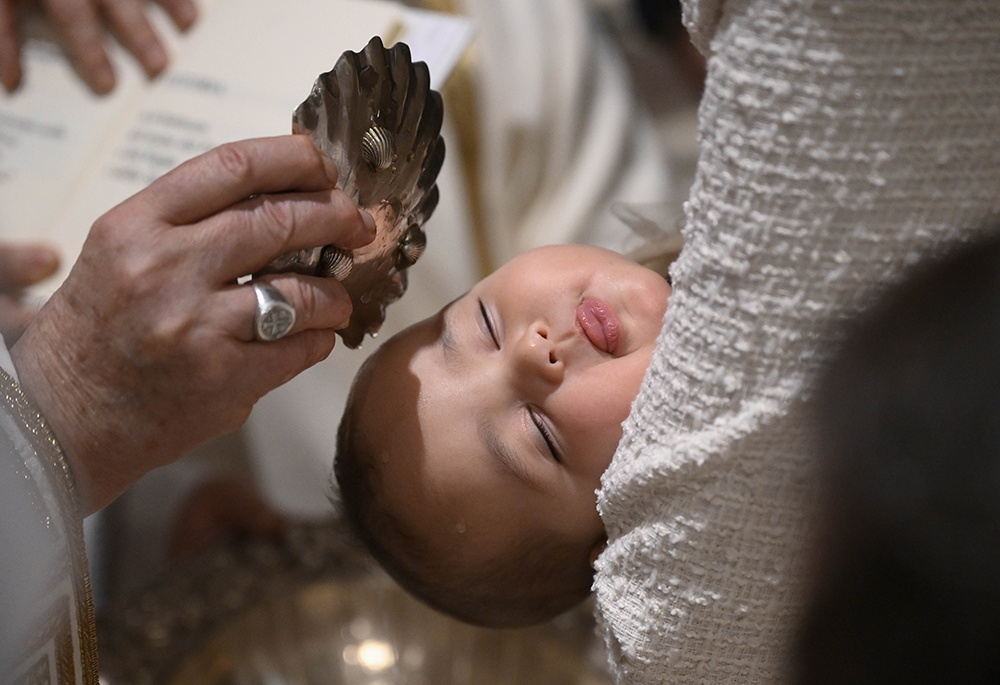
Pope Francis baptizes a baby during Mass in the Sistine Chapel at the Vatican Jan. 7, 2024, the feast of the Baptism of the Lord. (CNS/Vatican Media)
Topic 9 ("Women in the Life and Mission of the Church") asks that:
[W]e avoid repeating the mistake of talking about women as an issue or a problem. Instead, we desire to promote a Church in which men and women dialogue together, in order to understand more deeply the horizon of God's project, that sees them together as protagonists, without subordination, exclusion or competition.
Furthermore, there is a need for structural change:
Our synodal path shows the need for relational renewal and structural changes. In this way we can better welcome the participation and contribution of all … as co-responsible disciples in the work of mission.
In addition to ongoing consideration of female deacons, synod proposals call for inclusive language in liturgical texts, expansion of women's access to theological studies, equal remuneration for pastoral work and allowing female judges to preside at canonical trials. Topic 8 also asks for consideration of lay preaching.
Topic 10 ("Consecrated Life and Lay Associations and Movements: A Charismatic Sign") gives a shout-out to discernment models already used by most religious communities and acknowledges that our groups have been living synodality for a very long time:
The Christian community also recognizes and wishes to be attentive to the practices of synodal life and discernment that have been tried and tested in communities of consecrated life, maturing over the centuries. We know that we can learn from them wisdom in how to walk the synodal path.
One proposal calls for a revision "in a synodal manner" of Mutuae Relationes, a 1978 document addressing relationships between bishops and religious communities. In 2013 Pope Francis promised such an update in the wake of the disastrous Vatican attempt to discredit U.S. religious communities of women.
Topic 11 ("Deacons and Priests in a Synodal Church") agreed that clericalism is an obstacle to ministry and mission. It says:
In a synodal Church, ordained ministers are called to live their service to the People of God in a disposition of proximity to people. … Above all, they are required to reconsider the exercise of authority, modelling it upon Jesus who, "though he was in the form of God, [...] emptied himself, taking the form of a slave" (Phil. 2:6-7).
One courageous — and paradigm-shifting — proposal said:
We ask local churches to identify processes and structures that allow for a regular audit of how priests and deacons are carrying out roles of responsibility in the exercise of their ministry.
Another noteworthy proposal asks that priests who have left the active ministry be included in "pastoral services that recognize their formation and experience." It is shocking that priests who left the active ministry are currently forbidden to serve as lectors and communion ministers, ministries commonly performed by laypeople.
Advertisement
Topic 12 ("The Bishop in Ecclesial Communion") says:
As the visible principle of unity, he [the bishop] has, in particular, the task of discerning and coordinating the different charisms and ministries sent forth by the Spirit for the proclamation of the Gospel and common good of the community. This ministry is realized in a synodal manner when governance is accompanied by co-responsibility. …
One of the most substantive proposals suggests creating legal mechanisms for ensuring bishop accountability:
It is necessary to implement, in forms legally yet to be defined, structures and processes for regular review of the bishop's performance, with reference to the style of his authority, the economic administration of the diocese's assets, and the functioning of participatory bodies, and safeguarding against all possible kinds of abuses. A culture of accountability is an integral part of a synodal Church that promotes co-responsibility, as well as safeguarding against abuses.
The assembly also asked for a review of various authoritative teachings about "the relationship between the sacrament of Holy Orders and jurisdiction":
[It] needs to be studied in greater depth. In dialogue with Lumen Gentium and more recent teachings such as [Pope Francis'] Apostolic Constitution Praedicate Evangelium, the aim of such a study would be to clarify the theological and canonical criteria underlying the principle of the shared responsibility of the bishop and to determine the scope, forms and implications of co-responsibility.
As next October's second session of the synod unfolds, the jurisdiction issue is one to watch. If a corresponding proposal is sent to Pope Francis, it could have wide-ranging implications for church ministry and decision-making.
Given all of the above, there is good reason to hope that the synod on synodality will recommend substantive structural change to Pope Francis next October.
'There is good reason to hope that the synod on synodality will recommend substantive structural change to Pope Francis next October.'
I hope I have piqued your interest in reading the synthesis report in its entirety.
If so, please consider continuing the conversation in your local church using available online resources.
The U.S. Conference of Catholic Bishops has issued guidelines that suggest holding two or three listening sessions during Lent and collaborating with Catholic affiliated groups and organizations.
A worksheet suggests choosing three priorities from the 20 topics covered in the synthesis and discuss concrete ways of implementing them in your own diocese or parish.
When the synod first opened, I was struck by the stunning image of lay women and men, bishops, priests and women religious gathered at roundtables.
It seemed a fulfillment of Chuck Lathrop's much-loved 1977 poem, "In Search of a Roundtable." Here is an excerpt:
For God has called a People,
not 'them and us'
'Them and us' are unable to gather around,
for at a roundtable, there are no sides
And ALL are invited to wholeness and to food. …Roundtabling means no preferred seating,
no first & last,
no better,
no corners for 'the least of these'
Roundtabling means being with,
a part of,
together,
and one
It means room for the Spirit and gifts
and disturbing profound peace for all.And it is we in the present
who are mixing and kneading the dough for the future.
We can no longer prepare for the past. …—Chuck Lathrop
[The full version is available here.]





